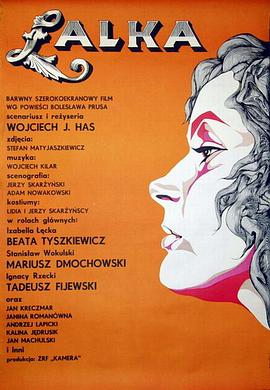主演的影片
1968
电影
/
剧情片
其它
Aleksander
Andrzej
Anna
Dewoyno
Fogiel
Gall
H
Halina
Irena
Jadwiga
Jan
Janina
Koecher
Kwiatkowska
Pieracki
Romanówna
Seniuk
Szramowska
Wladyslaw
克雷斯蒂娜.费尔德曼
卡里娜·谢鲁斯克
卢德维克·伯努瓦
塔德乌什·孔德拉特
安杰伊·瓦皮茨基
扬·克雷奇马尔
扬·马休斯基
维斯拉夫·格拉斯
菲耶夫斯基·塔德乌什
贝娅塔·蒂希基维茨
马里乌什·德莫霍夫斯基
The Doll is an adaptation of the novel, The Doll (novel) by Bolesław Prus, which is regarded by many as one of the finest Polish novels ever written and, along with Pharaoh (novel), made Bolesław Prus a potential candidate for the Nobel Prize in literature. The influence of Émile Zola is evident, and some have compared the novel to Madame Bovary by Gustave Flaubert; both were Prus's contemporaries. The movie, however, may be more compared to Stendhal's Le Rouge et le Noir, (The Red and the Black). The Doll constitutes a panorama of life in Warsaw between 1878 and 1879, and at the same time is a subtle story of three generations of Polish idealists, their psychological complications, their involvement in the history of the nineteenth century, social dramas, moral problems and the experience of tragic existence. At the same time this story describes the disintegration of social relationships and the growing separation of a society whose aristocratic elite spreads the models of vanity and idleness. In the bad air of a backward country, anti-Semitic ideas are born, valuable individuals meet obstacles on their way, and scoundrels are successful. This poetic love story follows a nouveau riche merchant, Stanislaw Wokulski, through a series of trials and tribulations occasioned by his obsessive passion for an aristocratic beauty, Izabela Lecka, played by the famous Polish actress, Beata Tyszkiewicz. Plot As a descendant of an impoverished Polish noble family, young Wokulski is forced to work as a waiter at Hopfer's, a Warsaw restaurant, while dreaming of a life in science. After taking part in the failed 1863 Uprising against Tsarist Russia, he is sentenced to exile in Siberia. On eventual return to Warsaw, he becomes a salesman at Mincel's haberdashery. Marrying the late owner's widow (who eventually dies), he comes into money and uses it to set up a partnership with a Russian merchant he had met while in exile. The two merchants go to Bulgaria during the Russo-Turkish War of 1877-78, and Wokulski makes a fortune supplying the Russian Army. The enterprising Wokulski now proves a romantic at heart, falling in love with Izabela, daughter of the vacuous, bankrupt aristocrat, Tomasz Łęcki. In his quest to win Izabela, Wokulski begins frequenting theatres and aristocratic salons; and to help her financially distressed father, founds a company and sets the aristocrats up as shareholders in his business.The indolence of these aristocrats, who secure with their pensions, are too lazy to undertake new business risks, frustrates Wokulski. His ability to make money is respected but his lack of family and social rank is condescended to. Because of his help (in secret) to Izabela's impecunious but influential father, the girl becomes aware of his affection. In the end she consents to accept him, but without true devotion or love.(wikipedia)
已完结
2022
电影
/
剧情片
其它
已完结
1973
电影
/
剧情片
其它
A bit of color for once, all the better to see the red flags with, not to mention the obvious aerial file footage of Warsaw. The story concerns Jozef Malesa, the mason or bricklayer of the title. He was once the darling of the party, the son of two old party activists, a worker of heroic reputation, his own commitment to The Movement unquestioned. He was chosen to be destined for great things, specially educated and pushed forward to positions of responsibility in the Party. Eventually he decides, because of the ethical pressures which he feels from the obstructionism of the bureaucracy from above, he asks to return to be a simple bricklayer. He is disturbed with the way the Party deals with people, especially their lack of direct contact. He thinks workers know better than the leadership many times but that's not the way power flows. He is uncomfortable with the compromises to his idealism. He remains committed to social justice and joins his friends for the May Day rally where his comfort and confidence in his place in society cause him to defer to no man, certainly no rat faced men in overcoats with red armbands. His great pleasure in life moreover is laying brick. He finds the work satisfying and fulfilling which is why he was such an obviously superior worker in the first place.
已完结




